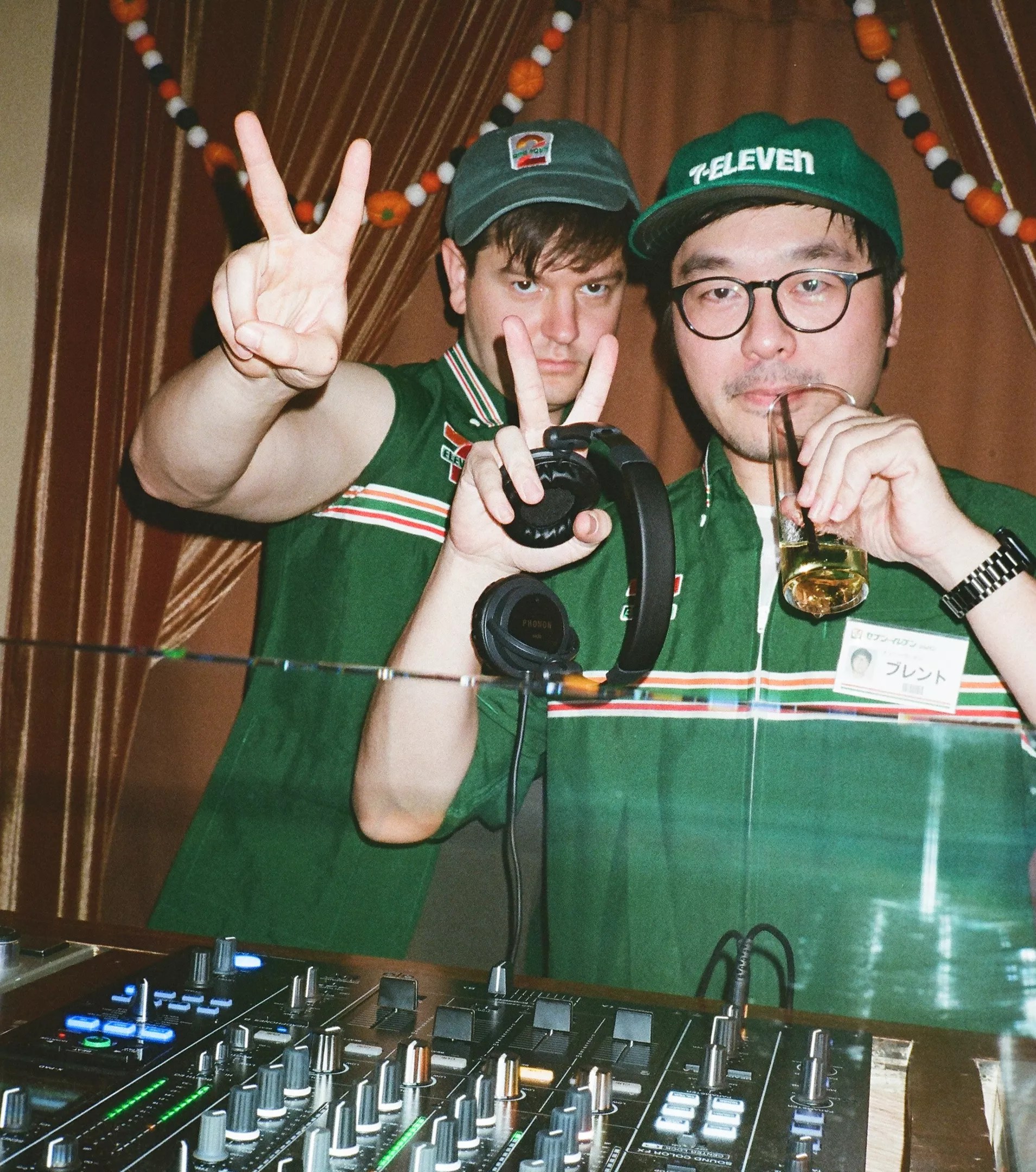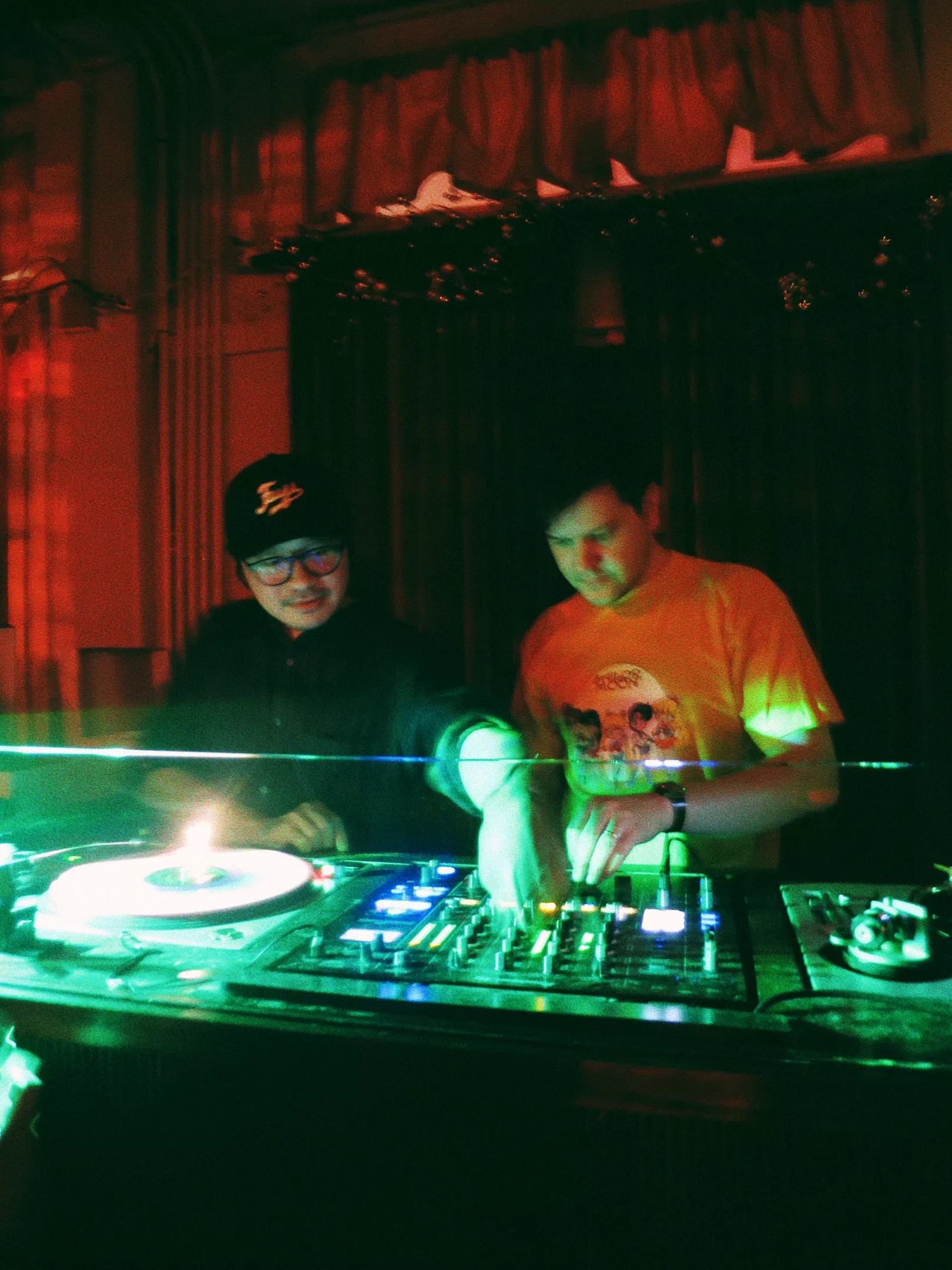
James Kung

Audio By Carbonatix
In 2025, life imitates digital art. When a cohort of vintage Japanese pop songs went viral on YouTube throughout the 2010s, city pop and J-pop went from an absolutely underground interest of a select few to the melancholic soundtrack for millions in their bedrooms.
Bringing this particular version of “bedroom pop” out of the bedroom and onto the dancefloor, Wamono Nights is a new, groovy vinyl series at LadyLove Lounge.
In March of 2024, Kyle Gardner, a Texas attorney originally from Devine, put on a Monday evening set at LadyLove using his collection of Japanese vinyl. Shortly thereafter, he ran into Brent Ozaeta – a Dallas native active in the visual art scene for over a decade – at the Dallas Art Book Fair. The two discussed their shared interest in Japanese music.
“I’ve collected records generally since I was, like, 15 or 16,” Gardner says. “I’ve now been twice to Japan and this last trip I actually got to meet a couple other guys that I’ve bought from for a long time. It was cool.”
Ozaeta confirms: “Kyle has a lot of records.”
That energy and love for collecting have come through in their collaboration on Wamono Nights. The series formally began in June 2024 after that March show, as LadyLove co-owner Kate Siamro recognized the energy and potential of a night unlike any other in the Dallas area.
“I got really excited because none of our DJs have ever offered [city pop] and I love it. And [Kyle] came in and my staff just fell in love with him,” Siamro says.
Wamono Nights officially launched as a vinyl-only DJ night focused on wamono, or vintage Japanese pop music, ranging from jazz and soul to disco or funk. Since its inception, the event has drawn strong crowds of nostalgia-loving rug cutters.
“I’m just always shocked … it’s really snowballed,” Gardner says. “The attendance keeps growing and there’s an appetite for this stuff.”
You might imagine that such a series would be niche, to say the least. And it might have been 15 years ago. In the past decade, however, YouTube algorithms and digital forums have given a second life to city pop and Japanese funk, among other vintage genres, attracting audiences across generations who are in need of a mellow, melancholic soundtrack to their late-night activity.

J-pop and vintage pop rules at LadyLove Lounge.
Victoria Nguyen
“Every Sunday, it gets bigger and better,” Siamro says. “I think it’s going to keep expanding.”
Part of the draw comes from Ozaeta’s popping pastel posters.
“I feel a lot the allure to the genre and the era of, you know, ’80s, late-’70s in Japan is sort of that aesthetic… drawing inspiration on ’80s magazine covers or Shonen Jump magazine covers where they [are] very colorful and poppy graphics,” Ozaeta says.
His experience in printmaking drives the naif feel behind these risographs. The posters run out quickly, and their cherubic logo has become a marker of style in Oak Cliff. Visuals are at the center of their most recent expansion: DJ nights at the Texas Theatre.
“I feel like in Dallas we have a lot of good repertory programming but Asian cinema is somewhat underrepresented,” Gardner says. “I reached out to [Texas Theatre’s] Barak [Epstein] and pitched a film series to them. And they were game. The film series, at least for now [will be monthly].”
The duo already have big plans for this branch of their endeavor.
“I’ll leave it a little vague but likely in April, I’ve been working on getting the screening rights to a movie that has never been shown in North America. It’s an animated film by the director of Serial Experiments Lain,” Gardner says. “We’ve got the translation process started. That’s really exciting. The film part of this has been just like a dream for me.”
Found in Translation
The date for the film Tomcat’s Big Adventure has been set for April 14 at the Texas Theatre.
Gardner and Ozaeta are conducting a communal ritual of summoning forth liminal energies from the digital realm to downtown Dallas. Drawing on their backgrounds, the two are bringing to life music (hits by artists such as Mariya Takeuchi, to deeper cuts on vinyl only), the visual (posters, totes, cult Japanese film and anime), and the atmosphere (taking advantage of the resonant sanctum of LadyLove).
“It’s kind of an homage to what a record lounge originally is, because they were created in Japan,” Siamro says. “The original listening lounge is a Japanese concept and it’s become more popular in America. So now you’re seeing more pop up in LA and New York and I’m really thankful we’re one of the first ones to pop up in Dallas. Where you have a room that’s tuned very neatly and there’s an emphasis on vinyl and turntables.”
She’s also thankful for the energy Wamono Nights brings to LadyLove. Those nights are filled with cheer, good humor, and engaged listening. That is all part of the spell these DJs are putting on.
“We wanna open the door with the stuff that people are familiar with and then we wanna take them a little bit deeper into the genre,” Gardner says, describing his approach to hypnosis-via-vinyl.
“I’ve been having a very enjoyable time doing this. Starting off, I didn’t expect to be a DJ,” Ozaeta says. “It was just sort of on a whim. It really picked up and people gravitate towards it … almost like there was secretly a need for it. Like myself, ‘Oh, I wish I could hear this music in the public sphere with my friends,’ and I guess everyone else was thinking the same thing.”
Wamono Nights trades in the feeling of nostalgia. Often, for a time or place that most of its audience haven’t experienced (’70s and ’80s Japanese city life). That said, the series redirects this energy from late-night doom-scrolling sessions into a reflective collective habitus of appreciation for whimsy, magic and debonair. With less than a year under their belt, it’s only upward and onward for the two. Soon enough, we might feel nostalgic, remembering what Wamono Nights was like when it was just starting out.